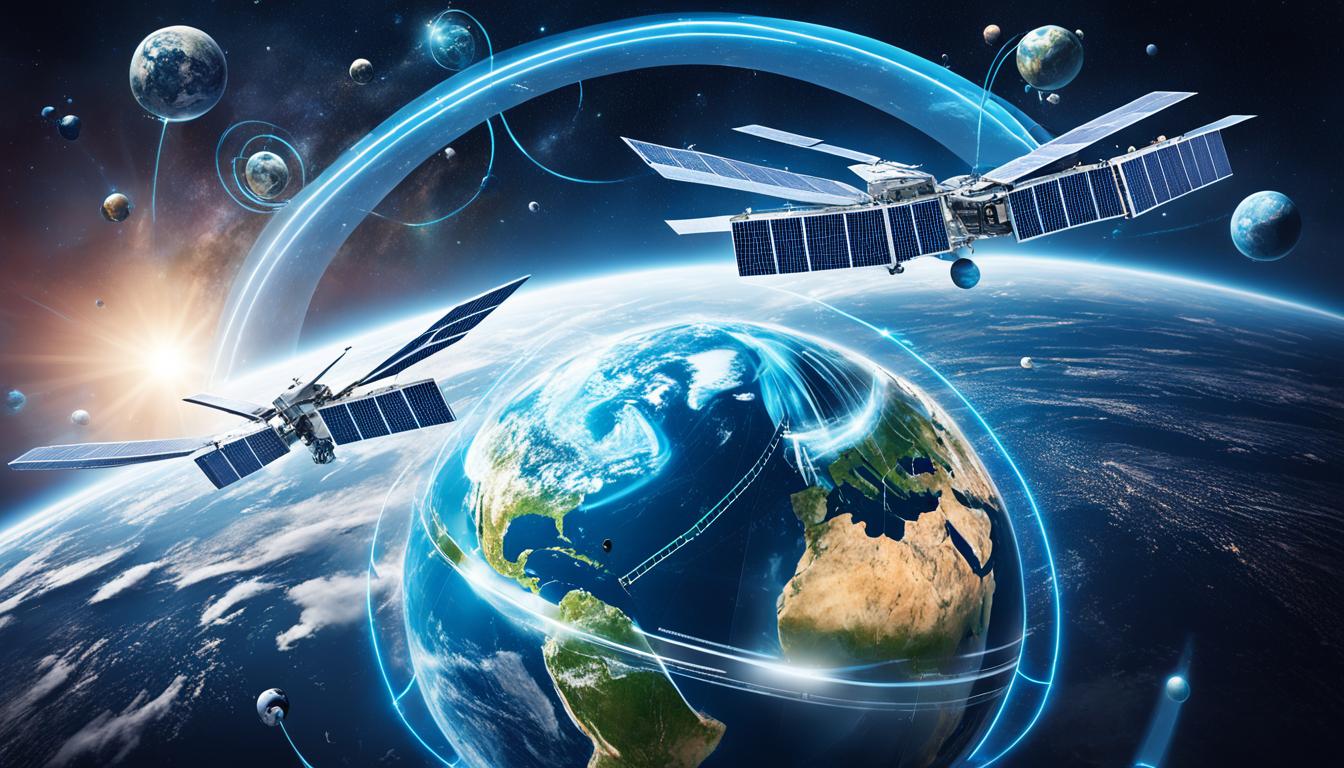Pasqal and Thales are working together on the AQUAPS Project to boost aerospace tech. They’re using Pasqal’s quantum processor to tackle satellite planning issues. This project has proven how neutral atom quantum computers can help plan satellite groups better.
This work wouldn’t be possible without support from Région Ile de France and GENCI. They greatly helped in changing how we plan satellites by bringing quantum tech into the mix.
Thales wants to lead the way in using these quantum tools for a wide range of users. They believe in the power of quantum computing to solve tough problems that regular computers struggle with.
Quantum computers could change everything by tackling problems we thought were too tough. We expect real uses for this by 2030. Right now, we’re testing the waters with technologies like cold atoms and ion traps.
Pasqal aims to set up a 200-qubit quantum computer in Saudi Arabia by 2025. At first, it will work in “analog mode,” later switching to “analog-digital mode.” This shift marks a big step towards practical quantum computing.
The AQUAPS Project is key for Pasqal and Thales, who want to transform satellite work. They’ve already secured over €140 million to push the real-world use of quantum computing. They hope this new tech will spark big changes in how we plan satellites and more.
Introduction to the Pasqal and Thales Partnership
Pasqal and Thales joined together for the AQUAPS Project, starting a journey to solve tough problems in satellite tech. For three years, they have worked closely in using neutral atoms to tackle complex issues in satellite planning. With the support from the Île-de-France region and GENCI, this partnership marks a huge leap in applying quantum computing in aerospace.
At the heart of their work is Pasqal’s Quantum Processor Unit (QPU), which is perfect for handling satellite planning steps. They aim to change how we do things with satellites, offering new solutions that go beyond what normal computers can do.
Innovations in Satellite Planning with Quantum Computing
Quantum computing is changing how we plan satellites. The AQUAPS project is a big step forward. Led by Pasqal and Thales, it shows how powerful quantum computing can be. Over the last three years, they’ve made algorithms that plan satellite missions well.
These changes come from using ‘qubits’. These are bits that can be in many states at once. This makes solving big problems faster. Thales spends almost €4 billion a year on new ideas. They believe in the power of quantum tech.

The Importance of Quantum Computing in the Aerospace Industry
Quantum computing is getting ready to shift the aerospace field. It’s giving scientists and engineers new ways to solve problems and analyze data. Pasqal’s quantum processors, with more than 100 qubits, are starting to tackle big, tough problems. These problems are too hard for normal computers. They are doing this by using the unique features of quantum mechanics.

Thales is a key player in moving quantum technology forward. They’re focusing on making better quantum sensors and communication tools. This work is key for things like simulating electromagnetic fields and solving hard optimization problems. Such work is crucial for making satellites work better and more efficiently.
The AQUAPS project is a big step forward in quantum computing for aerospace. It’s a team effort between Thales, Pasqal, and others. Thanks to funding and resources from Paris Region and GENCI, they’re exploring how quantum computers can improve air traffic planning and space mission scheduling. This shows how quantum tech could change how the aerospace industry works.
GENCI wants to share high-performance computing and AI with French scientists and industry. By making quantum computing accessible, it opens the door to solving big problems in aerospace. This could lead to huge advancements that were not possible before in the aerospace field.
Benefits of Quantum-Enhanced Satellite Planning
Quantum computing in satellite planning offers big advantages. It optimizes satellite constellations better. This allows for the efficient handling of more space assets. Using quantum algorithms satellite technology, Pasqal and Thales address tough problems effectively, problems that standard computers can’t solve.

Quantum-enhanced satellite planning improves resource use, calculations, and scheduling. It achieves levels of optimization not seen before. This makes satellite system management more precise and efficient. Thales is exploring quantum computing use in different sectors for both civil and military needs. By applying quantum algorithms to satellite missions, a new era of more exact and responsive satellite management is within reach.
Future Perspectives of Quantum Computing in Satellite Technology
The partnership between Pasqal and Thales marks a key breakthrough in quantum computing’s role in satellite tech. In the last three years, their work mainly dealt with using neutral atoms to make satellite planning better.
They hit a major milestone by solving a planning problem with a Quantum Processor Unit (QPU). This shows how well neutral atom quantum computers fit the needs of satellite planning.
The Île-de-France region and GENCI gave crucial support to this work. This project not only proves that quantum computing can benefit the space industry but also hints at its use in other fields, like in logistics, air traffic control, and for disaster help. You can find more about this breakthrough here.
By 2030, quantum computing is set to change how satellite systems work, offering better security and management. Pasqal and Thales are exploring these technologies and making progress using methods like the HHL algorithm. This work could lead to smoother satellite operations and better radar systems.
Support and Acknowledgments for the AQUAPS Project
The AQUAPS Project has made amazing progress in the last three years. This was possible because of big help from groups in France and beyond. Région Ile de France and GENCI gave funds and resources. This helped the team of Pasqal and Thales hit big goals in planning a new kind of satellite network using quantum computing.
Thales is known worldwide for their work in aerospace, defense, and security. They put almost €4 billion into cutting-edge research each year. Their focus includes AI, cybersecurity, and quantum technologies. Thales’ strong support for new projects shows their commitment to advancing technology.
Pasqal started making waves in quantum computing since 2019. They’ve collected over €140 million in funding. Working with Thales, they combined their powerful quantum processors with Thales’s aerospace expertise. Thales, with its large global team and big sales, is vital. This teamwork highlights a shared goal: to use quantum computing in solving crucial satellite planning challenges.
If you want to learn more about Pasqal and Thales’s quantum computing for satellite planning, check out their official announcement.
Source Links
- https://www.thalesgroup.com/en/group/innovation/magazine/quantum-computing-uncharted-territory-lots-new-applications-just-waiting
- https://www.hpcwire.com/off-the-wire/pasqal-partners-with-aramco-to-install-saudi-arabias-1st-quantum-computer/
- https://spaceimpulse.com/2024/05/01/addressing-the-challenge-of-space-debris-insights-from-orbotic-systems/
- https://thequantuminsider.com/2024/05/17/pasqal-and-thales-successfully-solve-satellite-planning-challenges-with-neutral-atom-quantum-computing/
- https://www.pasqal.com/news/pasqal-and-thales-tackles-satellite-planning-challenges/
- https://www.pasqal.com/case-studies/thales/
- https://thequantuminsider.com/2024/04/17/thales-and-sequre-quantum-sign-agreement-to-boost-their-technologies-in-the-space-market/
- https://quantumcomputingreport.com/news/
- https://thequantuminsider.com/2024/04/16/tqis-report-reveals-data-centers-use-of-quantum-computing-to-control-escalating-demand-for-computation/
- https://www.hpcwire.com/off-the-wire/quantum-machines-introduces-qdac-ii-compact-and-qswitch-for-enhanced-quantum-computing-performance-and-efficiency/


